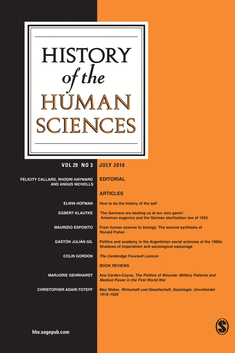Con el propósito de valorar los cambios introducidos en la historia de las ciencias humanas ante el desarrollo de las humanidades médicas, las ciencias biológicas y la teoría literaria y cultural, se celebró este encuentro sobre el futuro de este amplio campo pluridisciplinar, a instancias de la revista History of the Human Sciences y del Dr. Chris Renwick. Reproducimos aquí su post así como los enlaces a las charlas que tuvieron lugar.
“The Future of the History of the Human Sciences” – hosted jointly by History of the Human Sciences and Dr Chris Renwick – saw established scholars and early-career researchers gather in York for a two-day meeting in April 2016. The aim was to consider changes wrought in the broad interdisciplinary field of the history of the human sciences by new developments in the medical humanities, biological sciences, and literary/cultural theory. In so doing, these scholars not only marked the beginning of a new era for History of Human Sciences with a new editorial team, led by Felicity Callard, but also give thanks to the outgoing editor, James Good.
You can find out more about the conference on its website and in the reports on this blog from those who attended. Thanks to the kind permission of many of those who took part, we can now also make available recordings of a number of the talks. Abstracts for each talk can be found here.
• Roger Smith, “Resisting Neurosciences and Sustaining History”
• Steve Fuller, “Kuhn’s Curse and the Crisis of the Human”
• Des Fitzgerald, “The commotion of the social”
• Maurizio Meloni, “The Social as the Non-Biological: Genealogy and Perspectives”
• Jessica Hendy, “Molecular Archives of Human History: Moving Beyond Text-Based Sources”
• Michael A. Finn, “Possibilities and Problems with the Growing Archive”
• Peter Mandler, “The Language of Social Science in Everyday Life: What it Does, How it Circulates, How to Track it”
